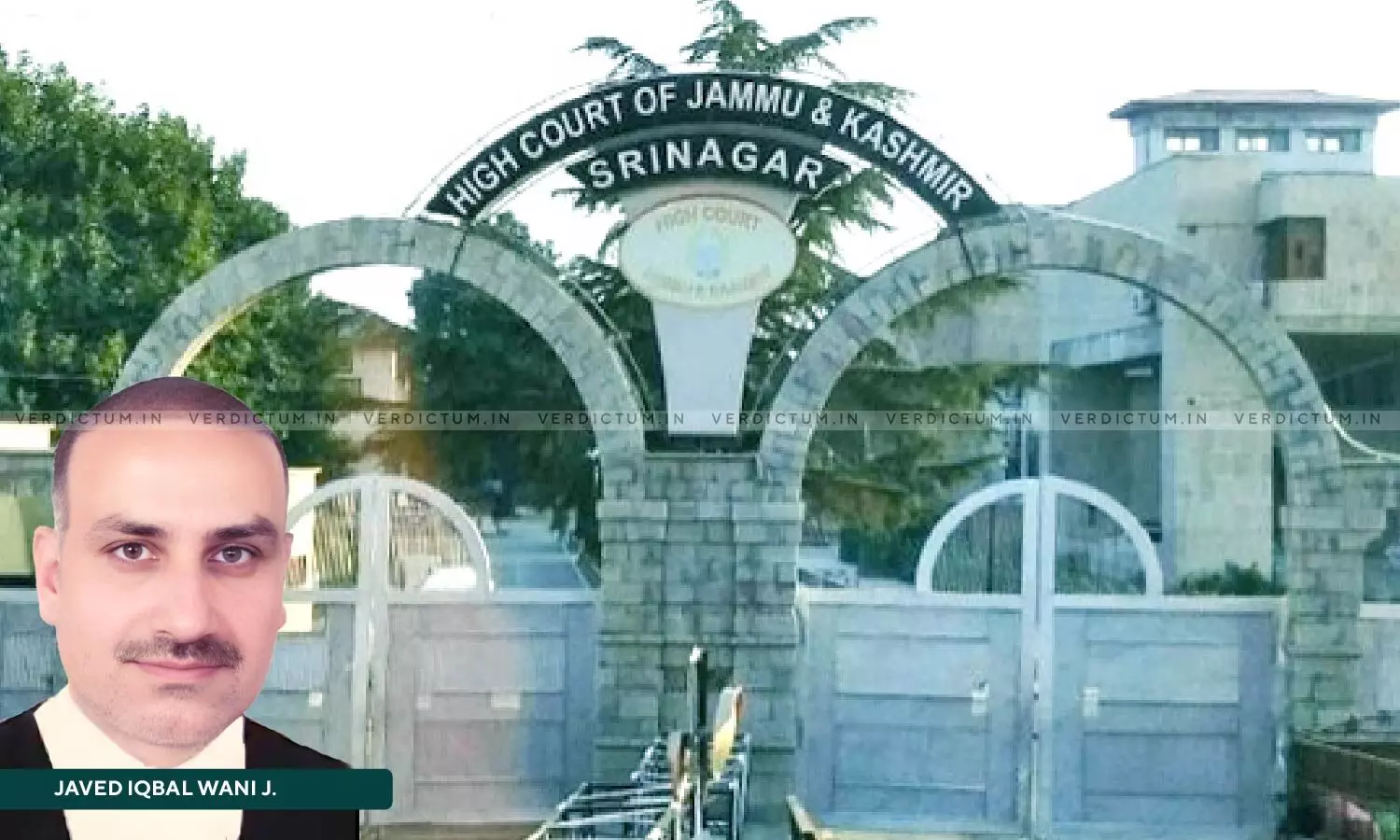
Justice Javed Iqbal Wani. Jammu and Kashmir & Ladakh High Court
Punishment In Disciplinary Matters Must Be Proportionate To Gravity Of Charge: Jammu And Kashmir & Ladakh High Court Quashes Retrospective Dismissal Of Retired Bank Employee
 |
|The Jammu And Kashmir & Ladakh High Court considered a Writ Petition filed by a retired bank employee regarding his retrospective dismissal following a disciplinary proceedings.
The Jammu and Kashmir & Ladakh High Court observed that punishment in disciplinary matters must be proportionate to the gravity of the charge and the surrounding circumstances. Further, the Court held that given the background of service, the nature of lapses and the manner in which the enquiry was conducted, the extreme penalty of dismissal from service, particularly, after retirement, was seemingly excessive and disproportionate.
The High Court considered a Writ Petition filed by the retired bank employee regarding his retrospective dismissal following a disciplinary proceedings.
The Bench of Justice Javed Iqbal Wani observed, “This Court is mindful of the fact, as also the position of law that punishment in disciplinary matters must be proportionate to the gravity of the charge and the surrounding circumstances, however, in the petitioner’s case, given the background of service, the nature of lapses and the manner in which the enquiry was conducted, the extreme penalty of dismissal from service, particularly, after retirement, seemingly, is excessive and disproportionate, more so, qua the forfeiture of pension, which in law, is a right earned by an employee for past services rendered and cannot be withheld or forfeited except in accordance with law and under valid rules… The Bank appears to have prejudged the matter and the enquiry seems to have been conducted more in the nature of a ritualistic compliance than a genuine fact-finding exercise, thus, rendering the enquiry proceedings vulnerable to judicial interference.”
Advocate Shuja Ul Haq represented the Petitioners, while Advocate Aadil Asmi represented the Respondents.
Case Brief
The Petitioner was dismissed from the services of Respondent-Bank retrospectively with effect from the date of his superannuation. The decision of the Respondent-Bank was affirmed by appellate authority as well. Pertinently, the Petitioner’s dismissal originates from a departmental disciplinary proceeding initiated during his service.
The Respondent-Bank alleged that the Petitioner made certain irregular Sanctioning of Temporary Overdrafts (TODs), some of which had turned into Non-Performing Assets (NPAs) within a short span of time. Further, the Petitioner was charge-sheeted for the following alleged acts of omission and commission:-
(i) Breach of rules of business of the bank and instructions for the running of a department.
(ii) Showing undue favour to any party by grant of concession against the banking practice likely to involve loss to the bank.
(iii) Doing acts prejudicial to the interest of the bank involving the bank in serious loss.
(iv) Misuse of official position and powers.
While, the Petitioner contended that orders are arbitrary, mala fide and based on no evidence. He also pleaded that the disciplinary proceedings were conducted in violation of the Office Service Manual, 2000 and that he was denied a fair opportunity to defend himself, while asserting further that the TODs in question were sanctioned as per verbal instructions from higher authorities.
The Petitioner also contended that no allegation of personal gain, corruption or fraud has been made against the Petitioner and his unblemished service record has been overlooked and that the retrospective dismissal order was legally unsustainable, especially when passed after his retirement.
Case Analysis
The Court referred to Rule 337 of Office Service Manual and noted, “an employee is expected to discharge his duties and exercise the powers vested in him by applying his own independent judgment, except in cases where he acts under the directions of his official superior, in which cases, he is required to obtain the directions in writing, wherever practicable, and if not immediately possible, to obtain written confirmation of such directions at the earliest opportunity.”
The Court also opined that the failure to summon the superior officer and offer the Petitioner an opportunity to cross-examine him, among other things, amounts to denial of reasonable opportunity to the Petitioner and offends the principle of Audi Alteram Partem.
Further, the Court took into account the more than three decades of services rendered by the Petitioner and the fact that during that long time there was nothing on record to suggest that his conduct was ever found wanting or that his professional integrity had been doubted.
“What is also manifest from the record is that the petitioner’s conduct was neither dishonest nor motivated by any personal gain and on the contrary, the petitioner’s requests for post-facto approvals, recoveries made in the Accounts and the absence of any allegation of pecuniary benefit point to a case of administrative misjudgment rather than a serious misconduct or least a misconduct”, the Court added.
The Court was not of the opinion that the Petitioner deserved to be visited with the harshest possible consequence for what appears to be an error in administrative judgment rather than a wilful or reckless act.
“Taking a holistic view of the matter, this Court is of the opinion that the punishment imposed upon the petitioner is not commensurate with the nature of the alleged lapses and the decision to dismiss the petitioner, particularly, with retrospective effect after his retirement appears not only excessive, but also inequitable, especially in the absence of a fair opportunity to present a full and effective defence. Given that the penalty of dismissal is found to be legally unsustainable and the proceedings vitiated by procedural lapses, the forfeiture of pension and other retiral benefits cannot be justified”, the Court observed.
Hence, the order passed by the Respondent Bank was quashed and the Court commanded them to release all the pensionary benefits in favour of the Petitioner.
Accordingly, the Petition was disposed of.
Cause Title: Naseer Ahmad Sheikh V. J&K Bank Limited (Neutral Citation: 2025:JKLHC-SGR:193)
Click here to read/download Judgment